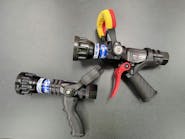Air traffic controllers at Miami International Airport's tower were forced to blindly guide eight arriving flights, using only radio, after a power failure knocked out their radarscopes for 17 minutes early Wednesday morning.
"The place went black," said Jim Marinitti, president of the National Air Traffic Controller Association's Miami tower chapter. "The controllers could talk to the flights; they just couldn't see them."
Most of the flights were cargo planes - six headed to Miami and two to Fort Lauderdale-Hollywood International Airport. They never were in danger of colliding because the pilots were close enough to the airports to see one another, he said.
The outage took place at 5:14 a.m., when air traffic is slow.
"If this had happened a couple of hours later, we would have been working a couple hundred flights, and there could have been a major disaster on our hands," Marinitti said.
Tammy Jones, Federal Aviation Administration spokeswoman, disputed that safety was compromised.
"Whenever something like this happens, controllers and FAA employees know what the backup plan is," she said.
The airport started experiencing electrical problems at 1:30 a.m. on Wednesday, when a fault in a Florida Power & Light feeder line caused a short power failure, FPL spokesman Jim Davison said.
But that problem was separate from a power failure in an FAA utility area, which resulted in power being cut to the control tower, Davison said.
"It was an FAA problem with their own equipment," he said.
Although backup generators immediately kicked in, a power surge blew out two batteries in the electrical system that feeds the control tower complex, Marinitti said.
The power was restored in two minutes, but it took another 15 minutes before the radar system computers reset, and even then they provided limited information, he said.
Because it was so early, only a few radarscopes were in use. From 7 a.m. to 10 p.m., controllers are positioned at 10 to 11 scopes, each of which handles 70 to 100 planes per hour, he said.
Marinitti said the incident demonstrates a need to retain an approach control unit at Palm Beach International Airport. The FAA plans to move those controllers to Miami within the next five years as part of a consolidation plan.
If Wednesday's power failure had lasted several hours, controllers at Palm Beach International Airport could have backed up Miami, Marinitti said. But because managers thought the outage would only last a few minutes, they did not request Palm Beach's help, he said.
Copyright 2005 LexisNexis, a division of Reed Elsevier Inc. All rights reserved.
Terms and Conditions | Privacy Policy
News stories provided by third parties are not edited by "Site Publication" staff. For suggestions and comments, please click the Contact link at the bottom of this page.





